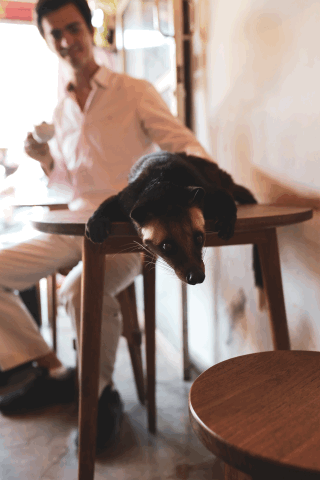Should You Drink the “Cat Poop” Coffee in Bali? All About Kopi Luwak

Kopi Luwak, otherwise known as Bali’s famous “Cat Poop Coffee”, is a modern-day delicacy born from Indonesia’s brutal colonial occupation. You will see Kopi Luwak advertised all over Bali, but should you drink it? Make an informed decision with this complete guide to Kopi Luwak, the most expensive coffee in the world.

What Is Kopi Luwak, AKA “Cat Poop Coffee”?
Kopi Luwak, as it’s known in Indonesia, is a luxury coffee made from partially digested coffee cherries harvested from the feces of the Asian Palm Civet. The coffee is partially fermented during the digestion process, giving a unique or subjectively “better” taste to the drink. There’s a lot of debate if the pre-digestion actually creates a superior coffee bean, or if the Kopi Luwak coffee is a total gimmick.

The Dark History Of Kopi Luwak Coffee In Bali
I remember as a kid wondering who was the first person to see a cow’s udder and think “I’m gonna drink whatever comes out of that”. The “cat poop” coffee in Bali also made me wonder, who could have possibly thought of this?! Who would go through the effort of extracting coffee beans from wild civet feces, without first knowing it would produce a superior product?
Apparently, the origins of civet coffee are extremely dark. During the Dutch occupation of Indonesia, the Dutch East Indies Company had coffee plantations on the islands of Java and Sumatra. The Dutch colonizers forbid the Indonesians (who were doing all the work) from picking coffee for themselves, so the natives turned to forage the beans that fell off the tree – Animals would sometimes get to the dropped coffee cherries before people could.

Someone discovered that civets, which have coffee cherries as part of their natural diet, would leave the beans mostly undigested, and scavenging civet droppings for beans turned into common practice. After tourism exploded in Bali, this historical process built from necessity was re-branded as a local “delicacy”.
The original reason that the Kopi Luwak was so expensive was because of scarcity, foresters would scour the jungle early in the morning looking for civet droppings, kind of like mushroom hunters. Each dropping only produced 5-6 beans, and it was extremely time-consuming to harvest.
Now, there are massive Civet coffee farms, and Cat Poop Coffee is considered a large industry in Indonesia.

3 Reasons You Shouldn’t Drink Kopi Luwak “Cat Poop” Coffee In Bali
1. Civet poop is Big Business in Bali
Since the rise of civet coffee, it’s become a major tourist attraction in Indonesia. They sell Kopi Luwak in the airports, and there are plantations that have “Luwak coffee tastings’ similar to how wine tastings are held at vineyards.
Even though it’s mass-produced now (more on that later), Kopi Luwak has held its “luxury” title from way back when it was rare, and it can command hundreds of dollars in the right market.
The big bucks being spent on Kopi Luwak coffee paved the path for big corruption. The now-massive civet coffee industry has been bashed by animal rights groups like PETA for animal abuse.
2. Most of it is Fake
Because the Kopi Luwak industry is huge and almost entirely unregulated, there’s no way to know that the coffee has actually been pre-digested by a civet. A ton of the civet coffee for sale is just normal coffee being sold at exorbitant prices with a “Kopi Luwak” label.
3. Animal welfare concerns
The booming industry surrounding Kopi Luwak Coffee, while good for tourism, has NOT been good for the civet animal. What was once a small cultural practice has exploded beyond what the civet population can naturally provide. Abuse in the Kopi Luwak market is rife, with bigger companies exploiting the animals by force-feeding them solely coffee cherries, which is only a portion of their diet in the wild. Feeding civets only coffee cherries can cause malnourishment, and drastically impacts their quality of life.

What Does Kopi Luwak Coffee Taste Like?
Full disclosure, before I knew about the unethical industry that is civet coffee, I tried it on my first trip to Indonesia in 2019. I was drawn to a cafe, which has since closed because it had two pet civet cats you could play with. The civets at the cafe were happy, healthy, and goofy little animals, rolling around and generally just causing chaos in the cafe. If I had to describe an Asian Palm Civet, it’s somewhere between a cat, raccoon, and bear.
The civets in the cafe were very cute, but now that I know more about the industry I doubt those happy healthy animals were the ones actually producing the coffee cherries used in the cafe.
The important part of this story is since I have tried the “cat poop coffee” before, I can tell you with complete certainty that civet coffee just tastes like normal coffee. There was nothing extraordinary about the coffee which could even attempt to justify the price, or animal cruelty it takes to produce.

Why is Cat Poop Coffee so Expensive?
Kopi Luwak, or “cat poop coffee” used to be so expensive because foraging forest floors for civet feces was extremely labor intensive. Nowadays the civets used for Kopi Luwak coffee usually come from Kopi Luwak farms. The animals are caged and fed coffee cherries in larger quantities than their natural diet would include, so Kopi Luwak coffee isn’t nearly as labor-intensive to produce as it used to be.
What Does Kopi Luwak mean?
“Kopi” is the Indonesian word for coffee, and Luwak is the local name for the Civet – so “Kopi Luwak” just translates to “Civet Coffee”.
What is Special About Kopi Luwak coffee?
Kopi Luwak coffee is special because the coffee beans undergo a fermentation process after being digested by the Asian Palm Civet. The beans are passed through the Civet’s digestive tract in-tact and are then roasted and processed as normal coffee beans. The civet’s digestive enzymes just remove a little bit of acidity in the finished cup of coffee, which makes for a slightly smoother taste.

Is Civet Coffee Cruel?
Yes! I think so. Even though I was fooled by seeing some happy and healthy civets in a cafe in 2019, it’s very unlikely those were the same animals used to create the Kopi Luwak coffee beans being served in the cafe. The demand for Kopi Luwak coffee has far exceeded the number of beans the population of Asian Palm Civets can naturally produce. There are reports of Civets being housed in cages their entire lives and force-fed coffee cherries to meet demand.
Is Civet Coffee Safe to Drink?
Drinking civet coffee is safe for people, the beans undergo a thorough cleaning, roasting, and later boiling when made into coffee which cleans and sterilizes the civet excrement.
